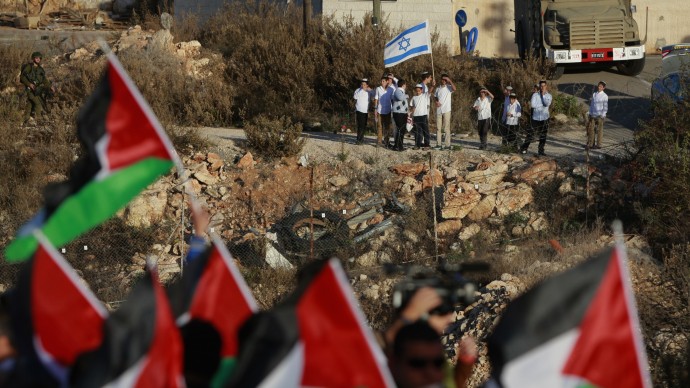
The death of Nelson Mandela, South Africa’s first black president, has sparked a global outpouring of grief and affection from presidents to prime ministers, to protesters and people on the streets of South Africa.
Mandela, the freedom fighter, prisoner and South Africa’s symbol of the struggle against racial oppression, died at the age of 95. His message of reconciliation, not vengeance, inspired the world. His action brought about a peaceful end to segregation and urged a nation to forgive the white government that imprisoned him. It is this legacy that continues to influence countries dealing with their own battles of oppression.
As the world reflects on Mandela’s legacy and his fight against apartheid in South Africa, some have recalled his famous words on apartheid: “We know too well that our freedom is incomplete without the freedom of the Palestinians.”
Palestinian president Mahmoud Abbas paid tribute on Friday to Mandela’s commitment to his people’s cause as he mourned the iconic South African.
“This is a great loss for all the peoples of the world, and for Palestine,” Abbas said, praising him as a “symbol of freedom from colonialism and occupation.”
Mandela, who first visited Israel and the Palestinian territories in 1999, championed the Palestinian cause to end to the systemic discrimination of Palestinians in Israel and to achieve peace in the Middle East.
“The Palestinian people will never forget his historic statement that the South African revolution will not have achieved its goals as long as the Palestinians are not free,” Abbas said.
In his struggle to end apartheid in South Africa, Mandela took on a new struggle in Palestine. He created a special bond between the two peoples and their fights against human-rights abuses and systematic discrimination. Sometimes both Palestine and black South Africa were fighting the same enemy, the Afrikaner regime.
Israel’s warm ties with the South Africa’s apartheid regime began in earnest in the mid-1970s, sharing military technology and intelligence. Over a period of about 15 years, they continued their alliance with the the Israel–South Africa Agreement pact, signed by Israel’s president Shimon Peres and then-South African defense minister PW Botha in 1975. This agreement increased economic cooperation between Israel and South Africa.
By the mid-1980’s, South Africa was sinking under the mounting international pressure and crippling sanctions that was disrupting the country’s economy. So it turned to Israel for assistance. The Israeli government helped the isolated South Africa’s apartheid regime circumvent international sanctions. This collaboration with the racist South African regime was roundly condemned in the U.N.’s General Assembly.
Yet what has really struck many in South Africa, and elsewhere, are the similarities between the historical apartheid system and Israel’s current policies toward the Palestinians.
In 2002, Archbishop Desmond Tutu wrote an article titled Apartheid in the Holy Land, saying that his trip to Palestine and Israel had reminded him so much of what happened to black people in South Africa.
“I have experienced Palestinians pointing to what were their homes, now occupied by Jewish Israelis. I was walking with Canon Naim Ateek (the head of the Sabeel Ecumenical Centre) in Jerusalem. He pointed and said: ‘Our home was over there. We were driven out of our home; it is now occupied by Israeli Jews.’ My heart aches. I say why are our memories so short. Have our Jewish sisters and brothers forgotten their humiliation?” Tutu wrote.
When Mandela visited Israel, he said late Palestinian president Yasser Arafat “was one of the outstanding freedom fighters of his generation … It is with great sadness that one notes that his and his people’s dream of a Palestinian state had not been realised.”
Apartheid is still destroying the lives of 4.4 million Palestinians. Human Rights Watch has repeatedly accused Israel of human right abuses. Over the decades, Israel has pushed Palestinians into designated areas or urban townships, with 70,000 Palestinian bedouin forcibly removed from their lands to live in the townships in Negev.
And in the West Bank, Israeli policy restricting travel of all Palestinians into smaller and smaller areas is forcing generations into poverty, with poor education and high unemployment.
It is estimated that 5,000 Palestinians are incarcerated in Israeli jails. HWR activists have criticized Israeli policy and policing, citing examples where they have detained people without warrants, failed to inform families promptly of detainees’ whereabouts, and subjected detainees to torture.
Today, as the world mourns a revered world leader, Palestine mourns an ally.
Reacting to the news of Mandela’s death, Palestinian leaders on Friday drew on his legacy, likening his fight against apartheid to their own struggle to end Israeli occupation.
In an open letter to Mandela, jailed Palestinian leader Marwan Barghouti defiantly said: “And from within my prison cell, I tell you our freedom seems possible because you reached yours. Apartheid did not prevail in South Africa, and apartheid shall not prevail in Palestine.”
Barghouti is widely believed to have masterminded the second Palestinian intifada that erupted in 2000. He was arrested in April 2002 and convicted on five counts of murder.
Despite the long prison sentence, Barghouti now enjoys widespread respect and support among all Palestinian factions. And even from his prison cell is considered a favorite to succeed Mahmoud Abbas as president of the Palestinian Authority.
The historic rise of Mandela from freedom fighter — or terrorist, according to the U.S and U.K governments — to now the world’s most respected politician and statesman has been a journey that most people would not have predicted.
With Barghuti currently serving a long prison sentence, but nonetheless having the backing of the majority of Palestinians, could he repeat what Mandela achieved and end apartheid in Israel?

